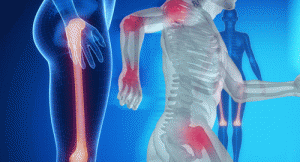 Women with postmenopausal bone loss also have increased levels of inflammatory cytokines in the bone marrow. This finding has led researchers to suggest that postmenopausal osteoporosis may appropriately be characterized as an inflammatory condition. Studies have also found that individuals with reduced taxonomic diversity of the gut microbiome are more likely to have inflammatory and/or metabolic disease.
Women with postmenopausal bone loss also have increased levels of inflammatory cytokines in the bone marrow. This finding has led researchers to suggest that postmenopausal osteoporosis may appropriately be characterized as an inflammatory condition. Studies have also found that individuals with reduced taxonomic diversity of the gut microbiome are more likely to have inflammatory and/or metabolic disease.
Together, this research has led investigators to successfully improve bone health by changing the gut microbiome with probiotics. The mechanisms behind the effectiveness of probiotics are, however, still not well understood. One suggestion is that, although in healthy individuals the resident flora of the gut lumen are separated from systemic tissue compartments by the intestinal epithelial, dysbiosis results in increased gut permeability, which leads to inflammation and pathology. If this is true, then probiotics that decrease gut permeability may be useful in the prevention of postmenopausal osteoporosis.
Jau-Yi Li, PhD, instructor of medicine at Emory University in Atlanta, and colleagues published the results of their investigation of this hypothesis on April 25 in The Journal of Clinical Investigation.1 They analyzed biochemical and histomorphometric indices of bone turnover in mice following 10 weeks of treatment with the gondadotropin-releasing hormone (GnRH) agonist Lupron Depot. Their study included mice raised in normal housing, as well as mice raised in germ-free conditions.
“We report that sex steroid depletion increases gut permeability and the production of osteoclastogenic cytokines in the intestine and the bone marrow,” write the authors in their discussion. “Mice housed in germ-free conditions are protected against intestinal and bone marrow inflammatory responses and the loss of trabecular bone induced by sex steroid deficiency. We also show that treatment with probiotics prevents the increase in gut permeability, the production of intestinal and bone marrow cytokines, and the bone loss induced by sex steroid depletion.”
Thus, the investigators found that the mice with sex steroid deficiency had altered cytokine levels in the bone marrow, as well as the small intestine. They proposed that these altered cytokines influence response to the gut luminal microbiota and, thus, play a pivotal role in inducing inflammation and bone loss in the Lupron Depot treated mice. They further suggested that TNFα is the key mediator in this interaction.
In an accompanying editorial, Jameel Iqbal, MS, PhD, associate scientist and senior fellow at the Icahn School of Medicine at Mount Sinai, N.Y., and colleagues cautioned that the interaction is likely to extend beyond TNFα.2
“If TNFα inhibition is indeed central to the action of probiotics in preventing hypogonadal bone loss, sequestration of TNFα by the monoclonal antibody infliximab in people—for example, those suffering from inflammatory bowel disease—would be expected to reduce bone loss,” write Dr. Iqbal and co-authors. “Surprisingly, such an effect was not found in a cohort of patients with Crohn’s disease, leaving the question open as to whether TNFα is the sole mediator of probiotic action on bone.”
Although the probiotic-induced protection against bone loss may not be determined entirely by TNFα, production does appear to be determined by the strain of probiotic. The investigators found that treatment with either the commercially available probiotic VSL#3 or Lactobacillus rhamnosus GG (LGG) was effective in protecting against bone loss. In contrast, treatment with a nonprobiotic strain of E. coli was ineffective.
Lara C. Pullen, PhD, is a medical writer based in the Chicago area.
References
- Li JY, Chassaing B, Tyagi AM, et al. Sex steroid deficiency-associated bone loss is microbiota dependent and prevented by probiotics. J Clin Invest. 2016 Apr 25. pii: 86062. doi: 10.1172/JCI86062. [Epub ahead of print]
- Iqbal J, Yuen T, Sun L, Zaidi M. From the gut to the strut: Where inflammation reigns, bone abstains. J Clin Invest. 2016 Apr 25. pii: 87430. doi: 10.1172/JCI87430. [Epub ahead of print]
